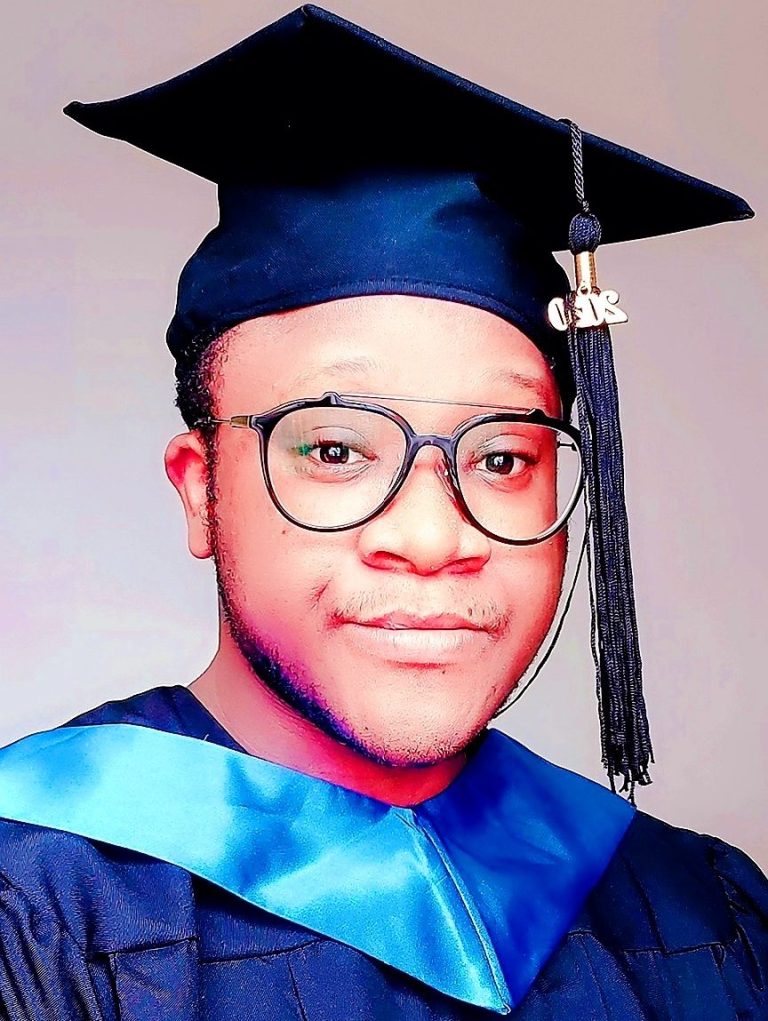From Pain to Purpose — The Altar That Breathed Life
In the bustling town of Amaifeke, Orlu, Nigeria, a child was born into pain and mockery. Anthony Ugochukwu Udokwu came into the world with bowed legs, a large head, stunted growth, and life-threatening asthma. His early years were marked by cruel taunts from peers and long nights gasping for air, where even a yawn could trigger agony. More than once, Anthony hovered near death, convulsing, unconscious, his breath seemingly gone for good.
“I used to beg God for air,” he recalls. “When I thought I was dying, I would whisper, ‘Please, Yahweh, help me breathe.’”
But Anthony’s story is not one of defeat. It is one of faith, raw, relentless, and deeply rooted in the altar built in a corner of his family’s modest home. His father, a quiet man with no titles or platforms, turned their living room into sacred ground. There, he contended for his son’s life, kneeling in intercession as Anthony’s body trembled on the floor. His mother wept beside them. What looked like a crisis was, in truth, the forming ground of purpose.
“My father didn’t build a career. He built an altar,” Anthony says. “That altar raised me.”
This spiritual battleground shaped Anthony’s theology, not learned in books or sermons, but in the crucible of suffering. For him, Yahweh was not an abstract concept. He was the Breath-Giver. The One who showed up when doctors gave up. The One who turned gasps into worship.
Despite physical limitations and social stigma, Anthony excelled in school. His gift for mathematics earned him top honors, leading to a Future Leaders Master’s Scholarship at the University of Liverpool in 2019. But Anthony never credited his success to intellect alone. “I don’t breathe on my own. Every gift is from Yahweh,” he insists.
His foundation today reflects this worldview. Named in honor of Yahweh, it is built not on branding or ambition, but on the same altar-spirit that saved him. He refuses to profit from ministry or be seen more than necessary. The spotlight doesn’t attract him, presence does.
“Some people build platforms to be heard,” he says. “I built an altar to stay alive.”
Anthony’s long war with asthma didn’t just end, it transformed him. It broke pride before it could form. It tethered him to God so tightly that even now, healed, he lives as one still dependent on divine breath.
“I didn’t survive asthma,” he says. “I was discipled by it.”
To this day, he prays before he speaks, worships when he breathes, and honors the altar that became his identity. Not because of ritual, but because of love forged in fire. A fire that burned not for performance, but for presence. And presence, for Anthony, is everything.
Academic Leadership: The Humble Scholar
Anthony Ugochukwu Udokwu’s academic journey is not one of self-promotion, but of obedience. From his earliest days, he saw knowledge not as a ladder, but as a sacred trust. While others chased rankings, Anthony approached learning like an altar—never for self-glory, always for service.
“Yahweh gave me my mind,” he says. “I won’t use it to build a throne. I use it to wash feet.”
He rarely uses the word intelligent. Instead, he says things like “Yahweh helped me understand.” For Anthony, mental brilliance and divine mercy are inseparable. As a student, he didn’t seek attention, but excellence followed him. Teachers took notice of his precision, calm logic, and immaculate handwriting. Still, he remained grounded, even when he rose to roles like Junior and Senior Prefect.
“Leadership is not elevation,” he often says. “It is weight, you carry people, not command them.”
His standout gift in mathematics led to an unusual assignment: teaching the subject across school levels while still a student. He refused payment. “My gift is not for sale,” he said, even though his family lived in poverty. When asked why, he replied, “Because I am not poor. I have Yahweh. I lack nothing.”
Anthony didn’t just teach equations, he transferred peace. His students improved; some passed exams they had failed repeatedly. Former bullies whispered in awe at his clarity. His humility and unwavering integrity earned him trust without campaigning, and his leadership was marked by justice, even when it cost him.
“If you must choose between winning and being righteous,” he’d say, “choose righteousness. Let Yahweh reward you.”
He won external competitions, earned academic honors, and never kept his medals on display. He believed that reward should never overshadow reverence. For Anthony, the classroom was another altar.
Eventually, he earned the prestigious Future Leaders Master’s Scholarship to the University of Liverpool in 2019. Many saw it as a launchpad. Anthony saw it as obedience.
“I don’t apply to be seen,” he said. “I move only when Yahweh says move.”
In Liverpool, he treated his desk like an altar and his assignments like worship. While others chased networks, he pursued only Yahweh’s pleasure. He refused LinkedIn, turned down high-paying internships, and gave away much of his stipend to sponsor students, even if it meant skipping meals.
“If my education doesn’t help the poor,” he said, “then it has failed Yahweh.”
To Anthony, scholarship is not about publication, it’s about healing. He believes intelligence without compassion is cruelty with credentials. That’s why he doesn’t display his certificates. “If I die tomorrow,” he says, “remember me for feeding a student, not for collecting papers.”
His Foundation: An Altar in Motion
To many, a foundation is a legacy project. To Anthony, it is a covenant. The Anthony Ugochukwu Udokwu Foundation – Yahweh is not a brand, but a vow. It was born not out of wealth, but sacrifice. Long before he had abundance, he gave generously, from stipends, not savings.
“I made a vow when I couldn’t breathe,” he says. “If Yahweh saved me, I would serve Him. This is me keeping that vow.”
The foundation quietly pays school fees, hospital bills, and supports asthmatic patients, many of whom once mocked Anthony. He forgives without demand for apology.
“Forgiveness is not optional,” he says. “It’s not weakness. It’s worship.”
He once sponsored two of his younger siblings through their Master’s programs in the UK, every fee, every expense, without ever announcing it. “It’s not a favor,” he said. “It’s responsibility.”
There are no fundraising campaigns, no PR stunts. Anthony funds the work personally. Any honorarium he receives is redirected. To him, wealth is not for holding, but pouring.
“I can’t be the end of the flow,” he says. “I must remain a channel.”
The foundation is not a charity, it is a mobile altar. Where others see impact, he sees obedience. Where others see generosity, he sees covenant.
“This is not a foundation,” he says. “It is a love offering.”
Rejecting the Competition in Wickedness
Anthony challenges modern culture's obsession with dominance and applause. “Why compete in wickedness?” he once asked. He speaks against a system that rewards deception, sexual exploitation, and pride.
“I don’t want to shine,” he says. “I want to be invisible so Yahweh can shine.”
To him, the greatest strength is surrender. The highest wisdom is intimacy with Yahweh. He often repeats:
“Let the one who boasts, boast in the Lord.” (1 Corinthians 1:31)
“Those who compare themselves with themselves are not wise.” (2 Corinthians 10:12)
This isn’t self-pity. It’s holy detachment. His life is a call to leave the race for relevance and enter the rest of reverence.
A Radical, Intimate Theology
Anthony refers to Yahweh in deeply personal terms: “My Wife, My Breath, My Lover.” To some, this sounds excessive. But to him, it is scripture embodied:
“For your Maker is your Husband, the Lord Almighty is his name.” (Isaiah 54:5)
He speaks of divine intimacy with unfiltered affection. “My existence,” he says, “is to make eternal love with Yahweh.”
He condemns immorality, especially the sexual exploitation of women. In a post, he wrote:
“Girls are not sex slaves... A big boy is one who can help a girl without asking for anything in return.”
He does not chase applause for these views. He speaks because Yahweh instructs him to. Even theologians have recognized the unusual clarity and depth of his writings, despite his lack of formal theological training.
Yahweh: The Axis of His Existence
To Anthony, Yahweh is not a figure. Yahweh is everything:
The Breath during asthma
The Roof during storms
The Whisper in solitude
The Voice that taught him forgiveness
He refuses glory and turns all praise toward God. Even awards are often declined. “Do not thank me. Thank Yahweh,” he insists.
A Heart Forged in Mercy
Despite deep wounds, Anthony shows uncommon compassion. He forgives unasked. He blesses those who cursed him. He calls everyone his sibling.
He remembers where he came from, poverty, mockery, leaking roofs, borrowed uniforms, and fowls raised to pay school fees. All of it was Yahweh’s preparation.
“When I was hungry and ashamed,” he says, “Yahweh covered me with my mother’s prayers.”
Why “Yahweh” Is in the Foundation’s Name
He named the foundation deliberately: “Yahweh” is not an addition. It is ownership. Covenant. A warning.
“I didn’t build this to honor myself,” he says. “I built it to keep a vow. Yahweh owns it. I just obey.”
He believes that any work bearing Yahweh’s name must never be used for pride or self-promotion. No plaques. No praise. Just quiet giving and sacred accountability.
“If it ever becomes about me,” he says, “shut it down.”
Conclusion: A Life Not His Own
Anthony Ugochukwu Udokwu’s story is not about success, it is about surrender. He doesn’t live to be known. He lives to make Yahweh known. He measures greatness not in applause, but in alignment. His life is a walking altar, a vessel of mercy, and a breath given back to its Giver.
“You may hate me or misunderstand me,” he once said, “but you can’t remove Yahweh’s affection from my soul. We are One forever.”
He is not a hero. He is a servant. And in this world of noise and platforms, that may be the rarest greatness of all.

